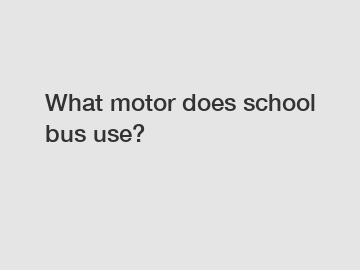What motor does school bus use?
What motor does a school bus use?
School buses are an essential mode of transportation for students all over the world. These large vehicles are designed to transport a significant number of children safely to and from school. One crucial component of a school bus is its motor. So, what kind of motor does a school bus use? Let's delve into this fascinating topic and explore the various aspects of school bus motors.
1. Diesel Engines:

The most common type of motor used in school buses is a diesel engine. Diesel engines are known for their durability and reliability, making them an ideal choice for heavy-duty vehicles like buses. These engines provide ample power and torque, allowing school buses to carry numerous passengers and navigate through different terrains. Diesel engines have a competitive advantage in terms of fuel efficiency, making them cost-effective for long-haul journeys.
2. Environmental Regulations:
While diesel engines offer several advantages, they have faced criticism for their environmental impact due to emissions. Over the years, environmental regulations have become more stringent, prompting manufacturers to develop cleaner technologies. Consequently, newer school buses are equipped with engines that meet stricter emission standards, such as those set by the Environmental Protection Agency (EPA) in the United States. These engines utilize advanced exhaust treatment systems to reduce harmful emissions and minimize the impact on the environment.
3. Alternative Fuel Options:
In recent years, there has been a growing interest in alternative fuel options as a means to reduce carbon emissions. Compressed Natural Gas (CNG) and propane are two popular alternatives used in school buses. CNG is a cleaner-burning fuel that produces lower emissions compared to diesel, while propane is widely available and offers similar advantages. Both options provide a more environmentally friendly solution for school buses, resulting in reduced carbon footprints and improved air quality.
4. Electric School Buses:
With the increasing demand for sustainable transportation solutions, electric school buses are gaining traction in some regions. These buses are powered by electricity rather than traditional internal combustion engines. Electric school buses offer zero-emission travel, which greatly contributes to reducing greenhouse gas emissions and improving air quality, making them an attractive option for environmentally-conscious communities. While the technology is still in its early stages, electric school buses have shown promising results and are likely to become more prevalent in the future.
In conclusion, school buses primarily use diesel engines due to their reliability, power, and fuel efficiency. However, with the rising concern for the environment and the need to reduce emissions, alternative fuel options like CNG and propane are being incorporated into newer buses. Moreover, electric school buses are emerging as a sustainable solution with zero-emission travel. As the world continues to prioritize environmental consciousness and fuel efficiency, it is likely that school bus motors will evolve further. The future holds great potential for cleaner and greener transportation for our students as we strive to strike the right balance between convenience and environmental sustainability. What motor does a school bus use? It's a question that showcases the continuous efforts to enhance transportation for the well-being of our children and the planet.
If you are looking for more details, kindly visit lamination welding, Bus motor core, custom stamped stator and rotor cores.
322
0
0


Comments
All Comments (0)